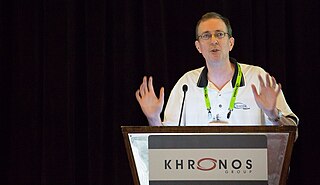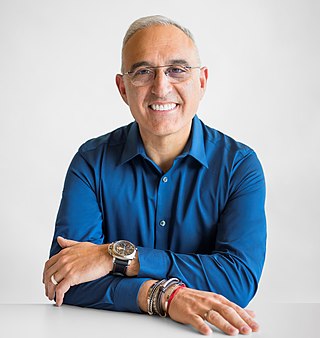
MIPS Tech LLC, formerly MIPS Computer Systems, Inc. and MIPS Technologies, Inc., is an American fabless semiconductor design company that is most widely known for developing the MIPS architecture and a series of RISC CPU chips based on it. MIPS provides processor architectures and cores for digital home, networking, embedded, Internet of things and mobile applications.

Silicon Graphics, Inc. was an American high-performance computing manufacturer, producing computer hardware and software. Founded in Mountain View, California in November 1981 by James Clark, its initial market was 3D graphics computer workstations, but its products, strategies and market positions developed significantly over time.
Fahrenheit was an effort to create a unified high-level API for 3D computer graphics to unify Direct3D and OpenGL. It was designed primarily by Microsoft and SGI and also included work from an HP-Microsoft joint effort.

Citrix Systems, Inc. is an American multinational cloud computing and virtualization technology company that provides server, application and desktop virtualization, networking, software as a service (SaaS), and cloud computing technologies. Citrix claims that their products are used by over 400,000 clients worldwide, including 99% of the Fortune 100 and 98% of the Fortune 500.

John Wendell Thompson is an American technology executive who was the chair of Microsoft from 2014 until June 2021, and chair of Illumina from 2021 until 2023. He is a former chief executive of Virtual Instruments, a vice-president at IBM and the former chief executive of Symantec. Thompson later became an independent director on the board of Microsoft, and in February 2014, was named chairman. He led the search for Microsoft's next CEO; as a result, Satya Nadella was selected.
Kai-Fu Lee is a Taiwanese businessman, computer scientist, investor, and writer. He is currently based in Beijing, China.

Kurt Akeley is an American computer graphics engineer.
Bruce R. Chizen is an American technology executive. He was the chief executive officer (CEO) of Adobe Systems from 2000 to 2007.
David E. Orton is an American engineering executive and the CEO of GEO Semiconductor Inc.

Silicon Wadi is a region in Israel that serves as one of the global centres for advanced technology. It spans the Israeli coastal plain, and is cited as among the reasons why the country has become known as the world's "start-up nation". The highest concentrations of high-tech industry in the region can be found around Tel Aviv, including small clusters around the cities of Raʽanana, Petah Tikva, Herzliya, Netanya, Rehovot, and Ness Ziona. Additional clusters of high-tech industry can be found in Haifa and Caesarea. More recent high-tech establishments have been raised in cities such as Jerusalem and Beersheba, in towns such as Yokneam Illit, and in Airport City. Israel has the third highest number of startups by region and the highest rate of startups per capita in the world.
Materials Studio is software for simulating and modeling materials. It is developed and distributed by BIOVIA, a firm specializing in research software for computational chemistry, bioinformatics, cheminformatics, molecular dynamics simulation, and quantum mechanics.

The Hewlett-Packard Company, commonly shortened to Hewlett-Packard or HP, was an American multinational information technology company headquartered in Palo Alto, California. HP developed and provided a wide variety of hardware components, as well as software and related services to consumers, small and medium-sized businesses (SMBs), and fairly large companies, including customers in government, health, and education sectors. The company was founded in a one-car garage in Palo Alto by Bill Hewlett and David Packard in 1939, and initially produced a line of electronic test and measurement equipment. The HP Garage at 367 Addison Avenue is now designated an official California Historical Landmark, and is marked with a plaque calling it the "Birthplace of 'Silicon Valley'".

Silicon Graphics International Corp. was an American manufacturer of computer hardware and software, including high-performance computing systems, x86-based servers for datacenter deployment, and visualization products. The company was founded as Rackable Systems in 1999, but adopted the "SGI" name in 2009 after acquiring Silicon Graphics Inc. out of bankruptcy.

Mike McCue is an American technology entrepreneur who founded or co-founded Paper Software, Tellme Networks, and Flipboard.
ArtX was a company founded in 1997 by Wei Yen, and was staffed by a group of twenty former Silicon Graphics engineers. The company was focused on delivering a graphics chip for IBM PC compatibles that was both high performance and cost effective, hoping to compete with then-dominant 3dfx and fledgling competitors such as nVidia. The appointed President of ArtX was David Orton, formally the head of the advanced graphics division in Silicon Graphics.

The Hewlett Packard Enterprise Company (HPE) is an American multinational information technology company based in Spring, Texas.

Rick Bergman was the president and CEO of Synaptics from 2011 to March 2019. He joined Synaptics in September 2011 from Advanced Micro Devices, Inc. (AMD), where he served as senior vice president and general manager of AMD's Product Group. He had been a longtime executive in the graphics chip business, serving in many positions at ATI Technologies before it was acquired in 2006 by AMD.
Viavi Solutions, formerly part of JDS Uniphase Corporation (JDSU), is an American network test, measurement and assurance technology company based in Chandler, Arizona. The company manufactures testing and monitoring equipment for networks. It also develops optical technology used for a range of applications including material quality control, currency anti-counterfeiting and 3D motion sensing, including Microsoft's Kinect video game controller.

Antonio Neri is an Argentine-Italian-American businessman who currently serves as president and chief executive officer (CEO) of Hewlett Packard Enterprise (HPE). Born in Argentina, he studied engineering at National Technological University and started working for Hewlett-Packard in 1995. Neri joined HPE's board of directors upon his promotion to the president and CEO position in 2018.











